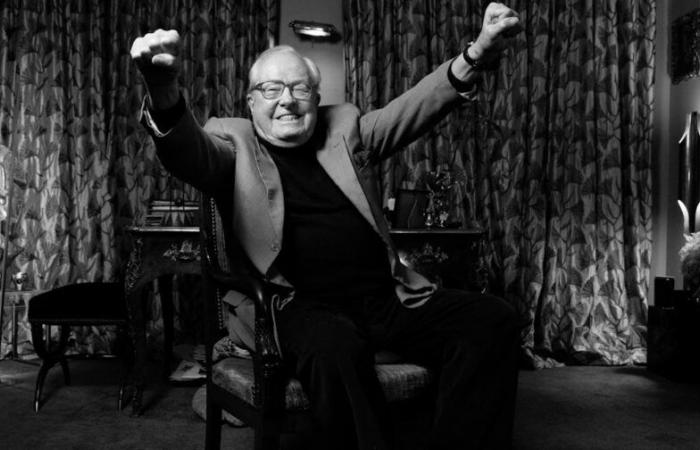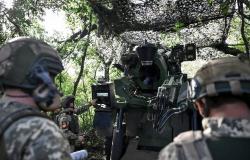
Jean-Marie Le Pen died on Tuesday January 7, at the age of 96. President of the National Front from 1972, he only obtained significant results after the left came to power in 1981, before qualifying for the second round of the presidential election in 2002. His speech focused almost exclusively on on the immigrant, made responsible for unemployment, insecurity and the loss of national identity.
An important figure in French political life for nearly sixty years, Jean-Marie Le Pen gave the far right a visibility and longevity that it had never had in contemporary France until then.
The beginnings of his political career shed light on the original positioning which was his and which constituted one of the keys to his success, on the borders of the right and the extreme right, on the limit between the traditional political game and the protest tradition. .
Initially close to Action Française, the main anti-republican league, resulting from the Dreyfus affair, when he was president of the Corporation of Law Students in the early 1950s, in 1955 he chaired the Young Independents of Paris, a organization which claims the heritage of the “national” current which has dominated the Parisian political scene and in particular the Municipal Council since the beginning of the 20th centurye century.
It is thus part of the populist and nationalist heritage of the far-right leagues which had marked the interwar period and which then seemed to be reborn under the double impulse of the Poujadist movement and the defense of French Algeria.
In January 1956, at the age of 28, he was elected Poujadiste deputy for Paris: he was then the youngest member of the National Assembly. But he quickly distanced himself from a Poujadist group whose amateurism in politics made him foresee the rapid decline. He joined the Independents and Peasants group which brings together the conservative and parliamentary right, whose main leader is Antoine Pinay. It was under the label of the National Center of Independents and Peasants that he was re-elected as a deputy in November 1958, before being defeated four years later, like a large part of those who, favorable to French Algeria, intransigently refused Gaullian policy.
Against de Gaulle
During these six years spent in the National Assembly, Jean-Marie Le Pen embodied the most right-wing wing of the Independents, in increasingly radical opposition against Gaullism and its moderate allies, such as Valéry’s Independent Republicans. Giscard d’Estaing.
It was to continue this fight that, between 1963 and 1965, he led the presidential campaign of Jean-Louis Tixier-Vignancour, twenty-one years his senior, who had worked in the interwar leagues. then by the French state regime before defending the OAS activists. Despite resorting to modern propaganda methods, Tixier-Vignancour did not manage to broaden his electorate beyond those nostalgic for French Algeria.
In order to beat de Gaulle, he called for a vote for François Mitterrand in the second round – which Jean-Marie Le Pen did not accept. Immediately after the 1965 presidential election, he broke with Tixier-Vignancour and began crossing the desert, at the very moment when the radical right was attracting a new generation of activists, gathered around the Occident groups then New Order, and committed itself to around an ideological renewal, as evidenced by the creation of GRECE, then the Club de l’Horloge.
National-populism
Jean-Marie Le Pen is neither an activist nor an intellectual – but a politician. This is undoubtedly what explains why he was chosen to chair the National Front (FN) in 1972, a new party which aimed to unite small far-right groups. Since the failure of the Tixier-Vignancour candidacy, the latter have in fact wallowed in a radicalism synonymous with marginality.
From the outset, Le Pen rejects the extreme right label used in particular by the media and, as a presidential candidate in 1974, defines himself as the promoter of a “great national and popular movement” and the “spokesperson for a Right that dares to speak its name.”
Despite his notoriety, his qualities as a speaker and his media presence, the results were not up to par: he did not obtain 1% in the presidential elections of 1974 and did not manage to collect 500 signatures. necessary for a candidacy for the 1981 presidential election.
It was only ten years after the creation of the FN that the work of organization, propaganda and ideological synthesis carried out by Jean-Marie Le Pen began to pay off, in a context marked by the dismay of right-wing voters, shocked by the defeat of 1981, and by a social crisis which indirectly affects the credibility of the so-called government parties.
Above all, Jean-Marie Le Pen defines a line which makes it possible to reconcile the doctrine of identity, specific to the so-called “national” extreme right, with the frustrations of an electorate, from the middle and working classes, who are looking for rapid solutions to the crisis: it is the emergence of what we will quickly call “national populism”.
Immigration, an almost exclusive theme
He made the fight against immigration the central, if not exclusive, theme of his speech. The immigrant is in turn held responsible for the surge in unemployment, the rise in insecurity, urban violence and the crisis in the suburbs, the risk of the downgrading of the middle classes, the uprooting of France, diluted in a cosmopolitanism that, in his eyes, the socialist government promotes.
This simplistic discourse attracts new voters who offer the far right its first electoral successes since the short-lived outbreak of Poujadism: the FN crossed the 10% mark of the vote during the European elections of 1984 and the legislative elections of 1986, and Jean- Marie Le Pen herself reached 14.5% in the 1988 presidential election, then 15% in 1995 before close to 17% and qualify for the second round of the 2002 presidential election.
Success among workers and the unemployed
These twenty years of electoral success have allowed Jean-Marie Le Pen to entrench the far right in the French political landscape, by significantly modifying his electorate and renewing his frameworks and his discourse.
First recruiting the majority of its voters among the independent middle classes and the elderly, the FN conquered, in the 1990s, a younger electorate, also more popular: during the 1995 presidential election, it was Jean- Marie Le Pen who came first in the working-class electorate, of whom he received more than 21% of the votes, and among the unemployed, 28% of whom voted for him.
The far right now has elected officials, particularly in regional and municipal councils. Following the 1995 municipal elections, she even led four large municipalities in the south of France – including that of Toulon, where Le Pen’s former chief of staff, Jean-Marie Le Chevallier, was elected mayor. The FN is becoming a real party, with its satellite organizations, its executives, but also its clans and its apparatus struggles, as revealed by the merciless fight waged, in 1998, by Jean-Marie Le Pen and the one who appeared until ‘then like his second, Bruno Mégret.
A protest culture and its limits
The Le Pen-Mégret fight is not just a personal quarrel. It corresponds to a divide between two strategies, two positions. Trained at the Club de l’Horloge, from the parliamentary right, Bruno Mégret aspired to an alliance between the FN and the traditional right, to a synthesis between liberals and nationals with a view to exercising power.
Jean-Marie Le Pen never pursued this objective. Faithful to league culture, he embodies above all a protest right which exploits frustrations and anger to destabilize the political system. Certainly, he sought to expand his electorate by erasing a certain number of excesses and rough edges. But he never really engaged in a strategy of demonization, as his daughter Marine did in the 2010s. This is evidenced by the multiple provocations which have both marked and limited his rise, from the “detail” affair in 1987 up to the physical attack on a socialist candidate in Mantes-la-Jolie in 1997, including the pun on “Durafour-crematorium” in 1988 : each of these acts and speeches made him politically inaccessible and alienated in fact the prospect of an alliance with other political forces.
Personality marked by the great battles of the 20th centurye century (the Second World War, the fight against communism, the Algerian war, etc.), Jean-Marie Le Pen was the man who gave the French far right the central place it occupies in the landscape politics since the beginning of the 21st centurye century.
He was able to synthesize different sensibilities of the traditionalist, identitarian or populist right, which different political forces and personalities seek to capture today, from Laurent Wauquiez’s LR to Éric Zemmour’s Reconquête, passing, of course, through his two direct heirs, Marine Le Pen and Marion Maréchal.
But the levers of its political rise (the league and protest culture, the obsession with identity, the ambiguity cultivated with regard to the demons of the radical far right, etc.) also mark its limits. This is why Marine Le Pen, promoted to head of the National Front in 2011, exercised a real right of inventory over her father’s political legacy, rejecting anything that may recall past scandals without however denying the identity cultivated during so many years of political struggle.





